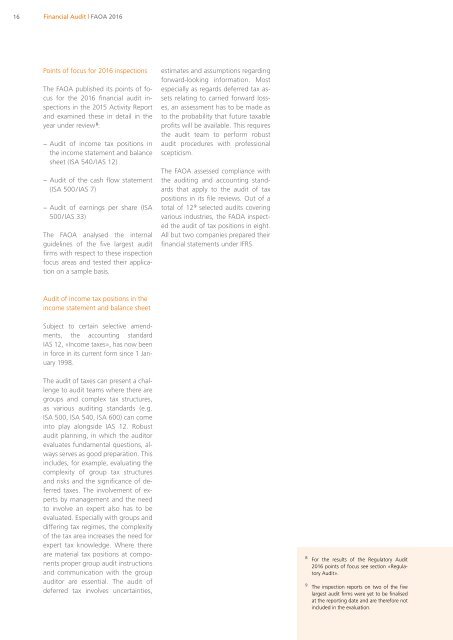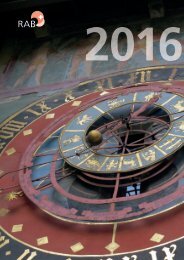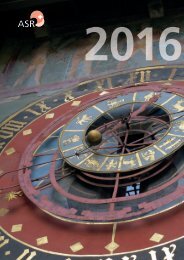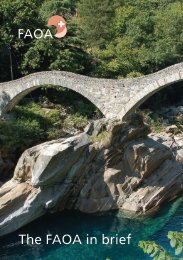Annual Report 2016
Annual Report 2016 - Federal Audit Oversight Authority FAOA
Annual Report 2016 - Federal Audit Oversight Authority FAOA
- No tags were found...
You also want an ePaper? Increase the reach of your titles
YUMPU automatically turns print PDFs into web optimized ePapers that Google loves.
16<br />
Financial Audit | FAOA <strong>2016</strong><br />
Points of focus for <strong>2016</strong> inspections<br />
The FAOA published its points of focus<br />
for the <strong>2016</strong> financial audit inspections<br />
in the 2015 Activity <strong>Report</strong><br />
and examined these in detail in the<br />
year under review 8 :<br />
− Audit of income tax positions in<br />
the income statement and balance<br />
sheet (ISA 540/IAS 12)<br />
− Audit of the cash flow statement<br />
(ISA 500/IAS 7)<br />
− Audit of earnings per share (ISA<br />
500/IAS 33)<br />
The FAOA analysed the internal<br />
guidelines of the five largest audit<br />
firms with respect to these inspection<br />
focus areas and tested their application<br />
on a sample basis.<br />
estimates and assumptions regarding<br />
forward-looking information. Most<br />
especially as regards deferred tax assets<br />
relating to carried forward losses,<br />
an assessment has to be made as<br />
to the probability that future taxable<br />
profits will be available. This requires<br />
the audit team to perform robust<br />
audit procedures with professional<br />
scepticism.<br />
The FAOA assessed compliance with<br />
the auditing and accounting standards<br />
that apply to the audit of tax<br />
positions in its file reviews. Out of a<br />
total of 12 9 selected audits covering<br />
various industries, the FAOA inspected<br />
the audit of tax positions in eight.<br />
All but two companies prepared their<br />
financial statements under IFRS.<br />
Audit of income tax positions in the<br />
income statement and balance sheet<br />
Subject to certain selective amendments,<br />
the accounting standard<br />
IAS 12, «Income taxes», has now been<br />
in force in its current form since 1 January<br />
1998.<br />
The audit of taxes can present a challenge<br />
to audit teams where there are<br />
groups and complex tax structures,<br />
as various auditing standards (e.g.<br />
ISA 500, ISA 540, ISA 600) can come<br />
into play alongside IAS 12. Robust<br />
audit planning, in which the auditor<br />
evaluates fundamental questions, always<br />
serves as good preparation. This<br />
includes, for example, evaluating the<br />
complexity of group tax structures<br />
and risks and the significance of deferred<br />
taxes. The involvement of experts<br />
by management and the need<br />
to involve an expert also has to be<br />
evaluated. Especially with groups and<br />
differing tax regimes, the complexity<br />
of the tax area increases the need for<br />
expert tax knowledge. Where there<br />
are material tax positions at components<br />
proper group audit instructions<br />
and communication with the group<br />
auditor are essential. The audit of<br />
deferred tax involves uncertainties,<br />
8 For the results of the Regulatory Audit<br />
<strong>2016</strong> points of focus see section «Regulatory<br />
Audit».<br />
9 The inspection reports on two of the five<br />
largest audit firms were yet to be finalised<br />
at the reporting date and are therefore not<br />
included in the evaluation.
















